
Epicurus and His Philosophy was first published in 1954. Minnesota Archive Editions uses digital technology to make long-unavailable books once again accessible, and are published unaltered from the original University of Minnesota Press editions.
In this volume, the first comprehensive book in English about Epicurus, existing data on the life of the ancient philosopher is related to the development of his doctrine. The result is a fascinating account that challenges traditional theories and interpretations of Epicurean philosophy. Professor DeWitt demonstrates the fallacy of centuries of abuse of Epicurus and the resulting distortion of most discussions of Epicureanism that appear in standard philosophical works. Of major significance to students of philosophy and theology are the findings that show the importance of Epicureanism as a source of numerous Christian beliefs.
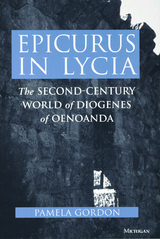
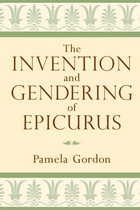
The school of Greek philosopher Epicurus, which became known as the Garden, famously put great stock in happiness and pleasure. As a philosophical community, and a way of seeing the world, Epicureanism had a centuries-long life in Athens and Rome, as well as across the Mediterranean.
The Invention and Gendering of Epicurus studies how the Garden's outlook on pleasure captured Greek and Roman imaginations---particularly among non-Epicureans---for generations after its legendary founding. Unsympathetic sources from disparate eras generally focus not on historic personages but on the symbolic Epicurean. And yet the traditions of this imagined Garden, with its disreputable women and unmanly men, give us intermittent glimpses of historical Epicureans and their conceptions of the Epicurean life.
Pamela Gordon suggests how a close hearing and contextualization of anti-Epicurean discourse leads us to a better understanding of the cultural history of Epicureanism. Her primary focus is on sources hostile to the Garden, but her Epicurean-friendly perspective is apparent throughout. Her engagement with ancient anti-Epicurean texts makes more palpable their impact on modern responses to the Garden.
Intended both for students and for scholars of Epicureanism and its response, the volume is organized primarily according to the themes common among Epicurus' detractors. It considers the place of women in Epicurean circles, as well as the role of Epicurean philosophy in Homer and other writers.

The first series of essays concentrates on the mechanisms Epicurus devised to assure the survival of the philosophy beyond its Athenian roots. Clay presents social history on an equal footing with doctrine, and offers for the first time evidence for hero cults among philosophers who believed that the soul died with the body. The second set of essays concentrates Epicureanism in the age of Cicero, Philodemus, and Lucretius. In the four essays on De Rerum Natura, Lucretius is viewed not as a transparency through which we can view the Greek of Epicurus, but a Roman philosopher in control of both doctrine and rhetoric. The book concludes with the study of the philosophy in Oenoanda, Lycia, in which the author brilliantly situates post-1968 discoveries from Oenoanda and the Villa de Papiri in Herculaneum in the context of the second-century mountain city.
This study of Epicureanism as a social movement will be of interest to students of ancient philosophy and the philosophy of early modern Europe, when Epicureanism was revived. In addition, scholars of the New Testament will find parallels to the rise and spread of Christianity.
Diskin Clay is the R. J. R. Nabisco Distinguished Professor of Classical Studies, Duke University.
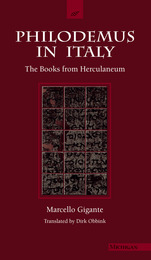
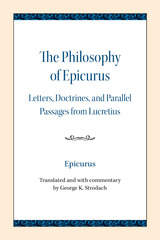

St. Paul and Epicurus was first published in 1954. Minnesota Archive Editions uses digital technology to make long-unavailable books once again accessible, and are published unaltered from the original University of Minnesota Press editions.
Everyone who is interesting in the meaning of the Bible will find this a revealing study, for it opens up a new window on the New Testament, a window that was walled up centuries ago by prejudice. Professor DeWitt throws new light on the writings of the Apostle Paul by showing how they were influenced by the teachings of the Greek philosopher Epicurus.
The Epicureanism could have a place in Christian religion may come as a surprise to those familiar with the conventional concept of the philosophy of Epicurus. As demonstrated in the meaning of the English word epicure,derived from the name of the ancient philosopher, the modern world has long associated Epicurus with the indulgence of sensual pleasure in food and drink.
But, as Professor DeWitt makes clear both in this volume and in its predecessor, Epicurus and His Philosophy, the pleasures which the ancient Greek espoused as constituting the chief good of life were not the pleasures of the flesh. The merit and the lure, however, of the Epicurean ethic, which allied happiness with pleasure, were so appealing and so widely acknowledged that Paul had no choice but to adopt it and bless it for his followers with the sanction of religion. He could not, though, admit indebtedness to a philosopher who had long been accused of sensualism and atheism, and there was no choice, therefore, but to consign Epicurus to anonymity.
Through his scholarly investigation into the Epicurean source of certain portions of the Epistles, Professor DeWitt provides new explanations or translations for seventy-six biblical verses. The close scrutiny of biblical passages is carried out, not in a spirit of vandalism, but in a quest for accuracy, and the result is a challenging, readable, and absorbing book.
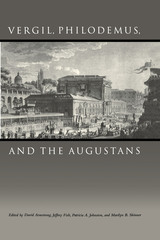
The Epicurean teacher and poet Philodemus of Gadara (c. 110-c. 40/35 BC) exercised significant literary and philosophical influence on Roman writers of the Augustan Age, most notably the poets Vergil and Horace. Yet a modern appreciation for Philodemus' place in Roman intellectual history has had to wait on the decipherment of the charred remains of Philodemus' library, which was buried in Herculaneum by the eruption of Vesuvius in 79 AD. As improved texts and translations of Philodemus' writings have become available since the 1970s, scholars have taken a keen interest in his relations with leading Latin poets.
The essays in this book, derived from papers presented at the First International Symposium on Philodemus, Vergil, and the Augustans held in 2000, offer a new baseline for understanding the effect of Philodemus and Epicureanism on both the thought and poetic practices of Vergil, Horace, and other Augustan writers. Sixteen leading scholars trace his influence on Vergil's early writings, the Eclogues and the Georgics, and on the Aeneid, as well as on the writings of Horace and others. The volume editors also provide a substantial introduction to Philodemus' philosophical ideas for all classicists seeking a fuller understanding of this pivotal figure.
READERS
Browse our collection.
PUBLISHERS
See BiblioVault's publisher services.
STUDENT SERVICES
Files for college accessibility offices.
UChicago Accessibility Resources
home | accessibility | search | about | contact us
BiblioVault ® 2001 - 2024
The University of Chicago Press









